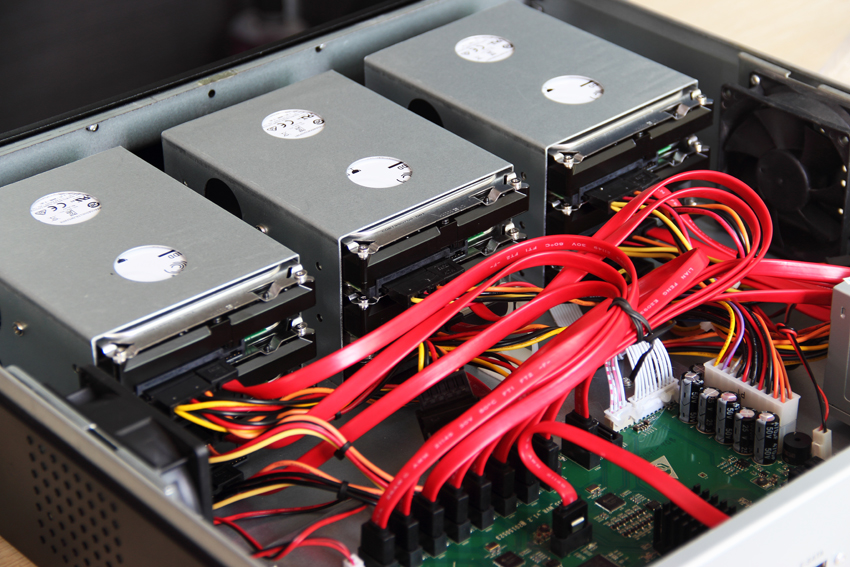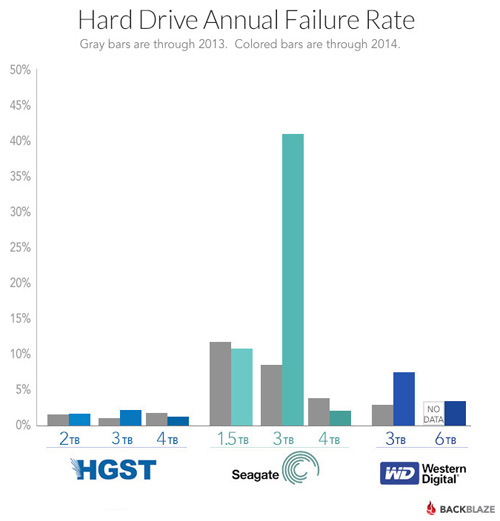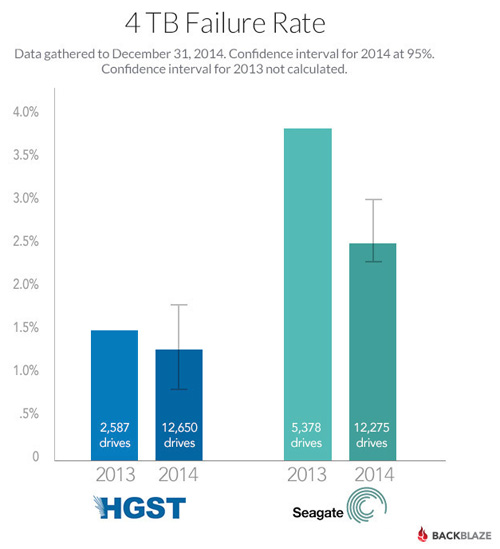
Choose HDD for video surveillance, Seagate or Western Digital?
Since the video surveillance enter into megapixel IP era, the required storage capacity significantly increased, which directly increased the demands for hard disc drives. So HDD manufacturers have already realized the trend, the needs from video surveillance industry become the main growth for them. Western Digital chose to cooperate with Hikvision to launched Purple series HDDs which are dedicated for video surveillance application. Seagate also launched ST4000VX000, which is a surveillance HDD addresses the increasing need for high-resolution cameras and camera counts, and ensures cost-effective performance and durability in always-on surveillance systems.
Evaluating the HDD's capacity
According to Rex Dong, when decide to use HDD, the first thing you want to consider is capacity. You may need to estimate the storage capacity for required video recording. Typically users opt to save costs by simply matching current capacity needs to your video surveillance demands. However, this may actually cost you more and create more upgrade issues in the long run. To choose the HDD capacity, you may take your future needs into consideration. Will you increase the resolution of your surveillance video in the future? Are you thinking about increasing the number of cameras due to business growth?
4K resolution will become the mainstream in the foreseeable future. The 4K video resolution is for times higher than your full HD 1080p resolution, which in turn, resulting in requires more than four times the amount of storage space as 1080p. Now, 500GB HDD will disappear from market, the maximum HDD storage capacity can reach up to 6TB, which can provide enough storage capacity for 64 cameras.
Reliability is very important
We don't recommend clients to use regular desktop computer HDDs for video surveillance. Since the working environment and condition is different, video surveillance requires a HDD that's not susceptible to the issues including heat-related failure or vibration from other drives, which can result in loss of video frames, data loss. What's the difference between regular computer HDD and surveillance dedicated HDD? Compared with computer HDD, surveillance dedicated HDD are designed for 90% write time and only 10% read time. The surveillance-specific drives are also engineered to reliably perform in multi-drive systems with RAID support. Optimized performance and reliability can minimize the effect of vibration from other drives with RV sensors, which mean fewer points for potential failure.
Western Digital or Seagate HDDs
In the market, you only can choose either Seagate or Western Digital. Now a question may come into your mind, which hard drive manufacturer is the most reliable? However, there is no failure data published by both manufacturers. But we still can find the answer from Data backup and recovery service companies such as Backlaze. Backlaze is a software company that offers user unlimited data backup service. At the end of December 2014, the company released its latest 2015 data shed some new light on failure rate of HDDs from different brands. Backblaze had 15,528 Seagate drives, 22,902 Hitachi drives, 1,174 Western Digital drives, and 47 Toshiba drives.

Checking the grathic above, with over 40% failing throughout 2014, and 9.6% failure rate in 2013, Seagate 3TB drives turned out to be a disaster. However, the new 4TB version improved significantly, as the second graph indicates below, with an excellent failure rate of just 2.6% — indicating that even a few years out, they should do much better than the 3TB models.The “annual failure rate” is the chance of a drive dying within a 12-month period. Western Digital is worse, but still impressive: After three years of operation, 92.4% of Western Digital Red 3TB drives are still running — not terrific, but still good.

HGST (Hitachi Global Storage Technologie) drives are by far the most reliable. The average failure rate of HGST drives is merely 2%, and the latest HGST drives have a failure rate of just 1.4%. In summary, if you want to choose a reliable HDD, you should stay with 4TB for the best value and reliability, and go with either Hitachi or Seagate.
| Backblaze Hard Drive Failure Rates, Cumulative by Quarter | |||||||
|---|---|---|---|---|---|---|---|
| Name/Model | Size | 12/31/13 | 03/31/14 | 06/30/14 | 09/30/14 | 12/31/14 | 03/31/15 |
| HGST Deskstar 7K2000 (HDS722020ALA330) | 2TB | 1.10% | 1.08% | 1.09% | 1.03% | 1.06% | 1.15% |
| HGST Deskstar 5K3000 (HDS5C3030ALA630) | 3TB | 0.90% | 0.85% | 0.70% | 0.73% | 0.74% | 0.74% |
| HGST Deskstar 7K3000 (HDS723030ALA640) | 3TB | 0.90% | 1.54% | 1.46% | 1.55% | 1.81% | 1.83% |
| HGST Deskstar 5K4000 (HDS5C4040ALE630) | 4TB | 1.50% | 1.33% | 1.25% | 1.06% | 1.17% | 1.16% |
| HGST Megascale 4000 (HGST HMS5C4040ALE640) | 4TB | 2.67% | 1.90% | 1.86% | 1.43% | 1.18% | |
| HGST Megascale 4000.B (HGST HMS5C4040BLE640) | 4TB | 20.29% | 1.23% | 0.59% | 0.52% | 0.48% | |
| Seagate Barracuda 7200.11 (ST31500341AS) | 1.5TB | 25.40% | 22.27% | 22.98% | 23.02% | 23.41% | 24.12% |
| Seagate Barracuda LP (ST31500541AS) | 1.5TB | 9.90% | 9.87% | 9.67% | 9.56% | 9.93% | 10.18% |
| Seagate Barracuda LP (ST32000542AS) | 2TB | 7.20% | 8.03% | 8.18% | 9.96% | 9.63% | 9.93% |
| Seagate Barracuda 7200.14 (ST3000DM001) | 3TB | 9.80% | 13.92% | 17.65% | 27.15% | 28.31% | 28.26% |
| Seagate Barracuda XT (ST33000651AS) | 3TB | 7.30% | 6.53% | 6.33% | 6.08% | 5.59% | 5.27% |
| Seagate Barracuda XT (ST4000DX000) | 4TB | 0.75% | 0.56% | 0.45% | 1.12% | 1.61% | |
| Seagate Desktop HDD.15 (ST4000DM000) | 4TB | 3.83% | 3.03% | 2.73% | 2.75% | 2.83% | |
| Seagate 6 TB SATA 3.5 (ST6000DX000) | 6TB | 1.70% | |||||
| Toshiba DT01ACA Series (TOSHIBA DT01ACA300) | 3TB | 4.63% | 3.48% | 4.20% | 4.81% | 4.23% | |
| Toshiba MD04ABA-V Series (TOSHIBA MD04ABA400V) | 4TB | 0.00% | |||||
| Toshiba MD04ABA-V Series (TOSHIBA MD04ABA500V) | 5TB | 0.00% | |||||
| Western Digital Red 3 TB (WDC WD30EFRX) | 3TB | 3.20% | 8.78% | 9.07% | 6.96% | 6.49% | 7.90% |
| Western Digital 4 TB (WDC WD40EFRX) | 4TB | 9.01% | |||||
| Western Digital Red 6 TB (WDC WD60EFRX) | 6TB | 13.75% | 3.07% | 6.64% | |||
Get My Latest Posts
Subscribe to get the latest updates.
Your email address will never be shared with any 3rd party.
Scan me




